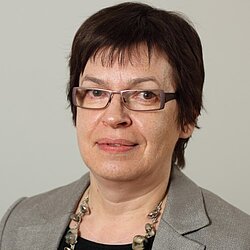International Economics and Commercial Diplomacy - Bachelor's Degree Programme
Programme level: Bachelor's Degree Programme
Language of instruction: Latvian
Study form and duration: full-time - 8 semesters
Credits: 240 ECTS
Obtainable degree or qualification: Bachelor of Social Sciences in Economics
Number of study places for admission in 2025/2026: State-funded study places - 7, study places for tuition fee - 50
Tuition fee per year (ac. year 2025/26): 3400 EUR for EU/EEA/Swiss citizens, EU Long-term resident permit holders and their family members. 3700 EUR for citizens of other countries
Study location: Riga, city centre
International Economics and Commercial Diplomacy is a unique multidisciplinary study programme which not only aims to provide students with extensive knowledge regarding international economics and business but also regarding legislation, politics and foreign languages. The study programme develops the necessary teamwork and presentation skills, capacity to understand and analyse macroeconomic and microeconomic tendencies, as well as practical skills in coordinating work among various institutions and managing organizations.
Study Program Director

Prof. Ērika Šumilo
- 1st year – practical entrepreneurship, mathematics for economists, political science, international organizations and economics globalization, population and development, microeconomics, integrated marketing communications, etc.;
- 2nd year – macroeconomics, theory of management, international economics, econometrics, international law, French, etc.;
- 3rd year – theory of accounting, economic anthropology, private international law, introduction to international politics, economy of the Baltic states, comparative analysis of world’s regions, etc.;
- 4th year – commercial diplomacy, international political economy, international capital flow, international monetary economics, international trade models, internship/practicum, bachelor thesis.
During the studies, academic knowledge is supplemented with practical knowledge via practicums and internships. During practicums and internships students are able to utilize their theoretical knowledge in real-life situations, thus gaining invaluable experience. Students obtain this experience in both private and government institutions such as the Ministry of Foreign Affairs and the Investment and Development Agency of Latvia.
Students can take part in practicums and internships both in Latvia and abroad via Erasmus+ exchange programme.
Graduates have the necessary skills to work in a variety of positions in Latvian and EU institutions, international organizations, and businesses. Many known graduates are currently working at the Ministry of Foreign Affairs, the Ministry of Economics, the Investment and Development Agency of Latvia and other government institutions.
Other graduates choose to start businesses themselves or to work in the private sector. Graduates are eligible to study in master’s programmes both in Latvia and abroad.
You can find out about the admission requirements for the study program by switching to the Latvian version of the website.
During a single cycle of studies, students have the opportunity to spend up to 12 months abroad for studies or internships. Currently, the Faculty of Economics and Social Sciences has over 320 Erasmus+ cooperation agreements with universities across Europe and beyond. Students can participate in exchange studies in countries such as Austria, Germany, Spain, Italy, Finland, Sweden, Turkey, Portugal, Slovakia, Malta, and many others.
In addition, students may take part in exchange programmes based on bilateral agreements, which allow for study opportunities in 53 countries worldwide — including Japan, South Korea, Taiwan, and more.
Short-term mobility options are also available through the FORTHEM Alliance, offering students the chance to gain new knowledge and skills in Germany, Poland, Norway, Romania, Italy, France, Finland, and Spain.
Additional information and study plan
Classes take place on weekdays from 8:30 AM to 6:00 PM according to the lecture schedule for the specific semester.
Atsauksmes
"Studiju programma ir ļoti daudzpusīga. Mēs apgūstam ne tikai ekonomikas un uzņēmējdarbības kursus, bet arī dažādus politikas, diplomātijas un valodu priekšmetus. Daudzveidīgās zināšanas uzlabo mūsu spējas orientēties pasaules notikumos, kā arī veicina izpratni par starptautiskajiem procesiem. Studējot šajā programmā, es izjūtu pastāvīgu attīstību ne tikai akadēmiskā ziņā, bet arī kā personība."
"Izvēloties studiju programmu "Starptautiskā ekonomika un komercdiplomātija", mani piesaistīja plašais zināšanu spektrs, ko tā piedāvā. Un pirmie divi studiju gadi man nelika vilties – programma ietver visas sociālās zinātnes no psiholoģijas un socioloģijas līdz ekonomikai un sniedz plašas valodas apguves iespējas. Vārds "starptautiskā" programmas nosaukumā ir pilnībā attaisnojis sevi, programmas kursos tiek plaši apskatīta pasaules ekonomika, globalizācijas un integrācijas jautājumi. Lai gan programma ir akadēmiska, viens no tās plusiem ir arī prakse, kas ļauj izvērtēt piedāvātās darba iespējas pēc programmas beigšanas un izvēlēties jomu tālākajām akadēmiskajām studijām."

 CONFERENCE
CONFERENCE